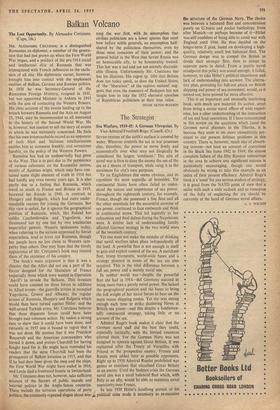Balkan Volcano
The Lost Opportunity. By Alexandre Cretzianu. (Cape, 18s.) MR. ALEXANDRE CRETZIANU is a distinguished Rumanian ex-diplomat, a member of the genera- tion that had just grown up when the First World War began, and a product of the pre-1914 social and intellectual elite of Rumania that was impregnated with French influences to the exclu- sion of all else. His diplomatic career, however, brought him into contact with the unpleasant realities of Balkan, German and Russian politics. In 1938 he was Secretary-General of the Rumanian Foreign Ministry, resigned in 1941, but was appointed Minister in Ankara in 1943 with the aim of contacting the Western Powers. His clear account of the events leading up to the breach between Rumania and the Axis on August 23, 1944, may be recommended to all interested In the history of the Second World War. He is, however, not content to tell the story of events in which he was intimately concerned. He feels that his own irreproachable record as an opponent of both Nazi and Stalinian totalitarianism entitles him to comment frankly, and sometimes harshly, on the policy of the Western Powers.
Rumania has had an undeservedly bad press in the West. This is in part due to the persistence of various calumnies on the Rumanian nation, mostly of Austrian origin, which may have con- tained some slight element of truth in 1910 but had hardly any even twenty years ago. It is also partly due to a feeling that Rumania, which owed so much to France and Britain in 1919, betrayed her friends in 1940, in contrast to Hungary and Bulgaria, which had more under- standable reasons for joining the Germans. But this view is unfair, for it ignores the geographical position of Rumania, which, like Poland but unlike Czechoslovakia and Yugoslavia, was threatened not by one but by two totalitarian imperialist powers. Western spokesmen today, when referring to the nations oppressed by Soviet imperialism, tend to leave out Rumania, though her people have no less claim to Western sym- pathy than others. One may hope that the timely appearance of Mr. Cretzianu's book may remind them of the existence of his country.
The book's main argument is that it was a disaster that the Allies did not use a part of the forces designed for the liberation of France (especially those which were wasted in Operation 'Anvil') to invade the Balkans. This invasion could have counted on three forces in addition to Allied troops—the guerrilla armies in occupied Yugoslavia, Greece and Albania; the regular armies of Rumania, Hungary and Bulgaria which Would then have turned against Hitler; and the well-armed Turkish army. Mr. Cretzianu believes that these disparate forces could have been brought into common action. He makes a strong case to show that it could have been done, and certainly in 1957 one is bound to regret that it was not done. He stresses that it was President Roosevelt and the American commanders who turned it down, and praises Churchill for having fought hard for it. He might have reminded his readers that the same Churchill had been the protagonist of Balkan invasion in 1915, and that if he had then been given the men and the ships, the First World War might have ended in 1916, and Lenin died a frustrated fanatic in Switzerland.
Mr. Cretzianu does not, however, take sufficient account of the factors of public morale and internal politics in the Anglo-Saxon countries. These include the tortuous operations of party politics; the constantly repeated slogan about win-a ning the war first, with its assumption that civilian politicians are a lower species that must bow before noble generals, an assumption half- shared by the politicians themselves, even by those most conscious of their power; and the general belief in the West that Soviet Russia was an honourable ally, to be honourably treated. This last was a sad and yet not entirely discredit- able illusion. Unfortunately Mr. Cretzianu too has his illusions. His regret (p. 169) that Britain does not today speak, as does the United States, of 'the "liberation" of the captive nations' sug- gests that even the massacre of Budapest has not taught him to take the 1952 electoral speeches of Republican politicians at their true value.
HUGH SETON-WATSON






























 Previous page
Previous page